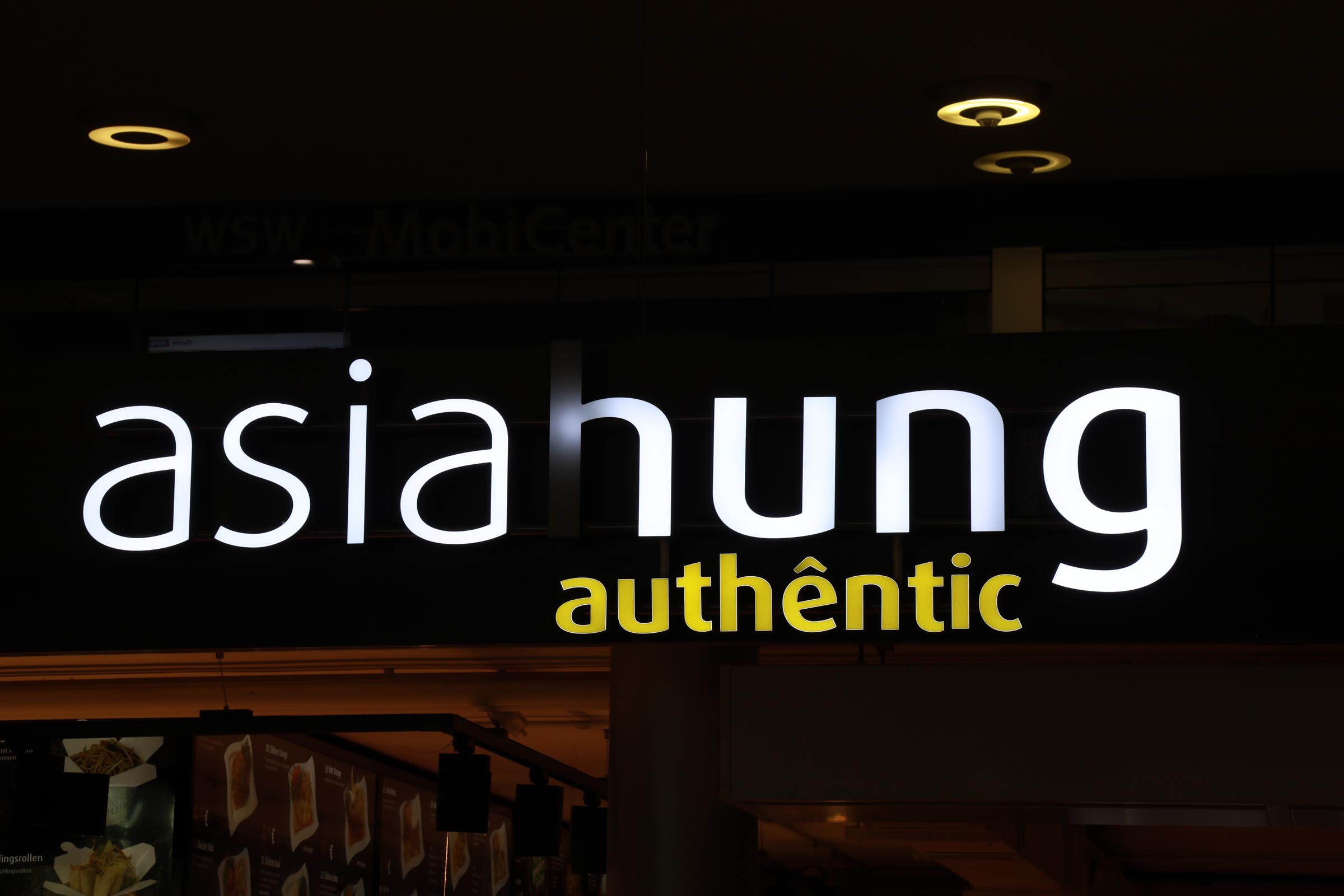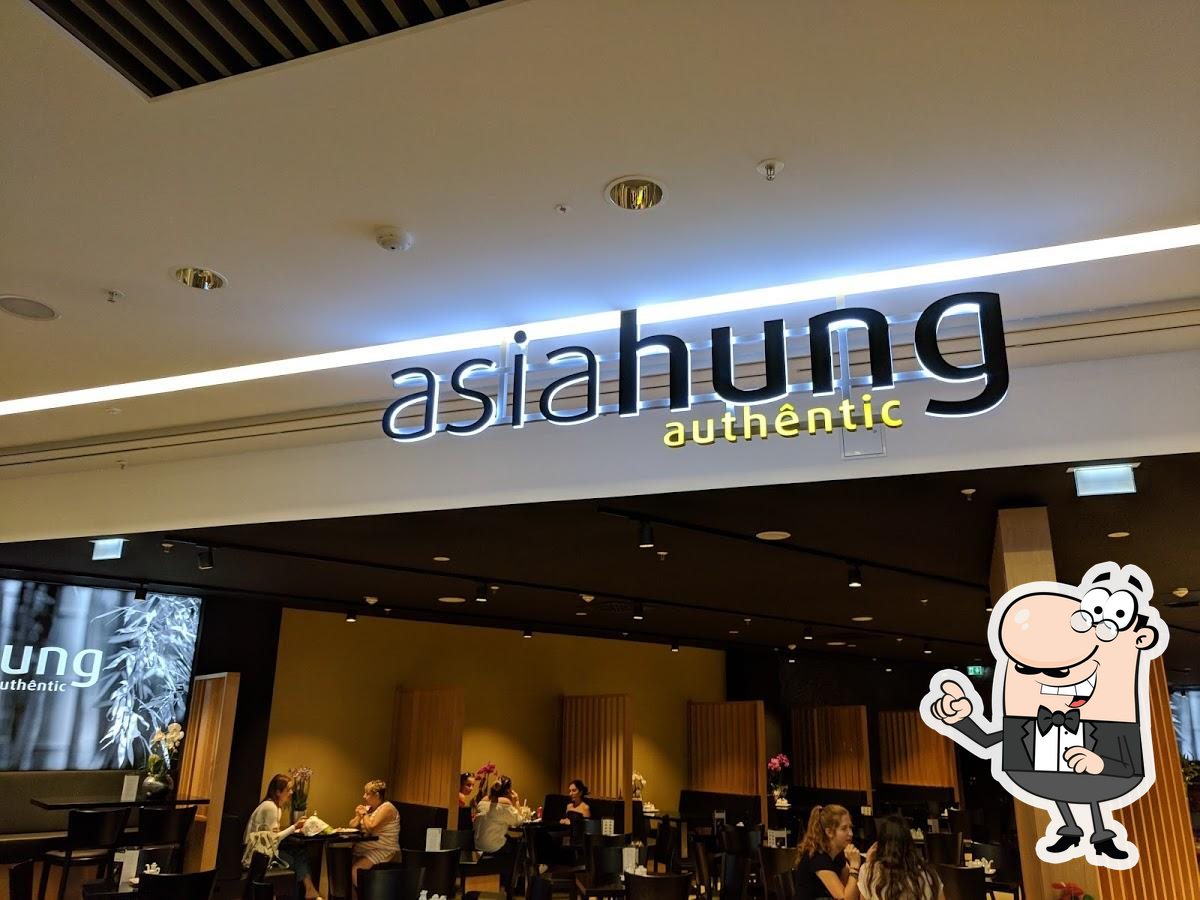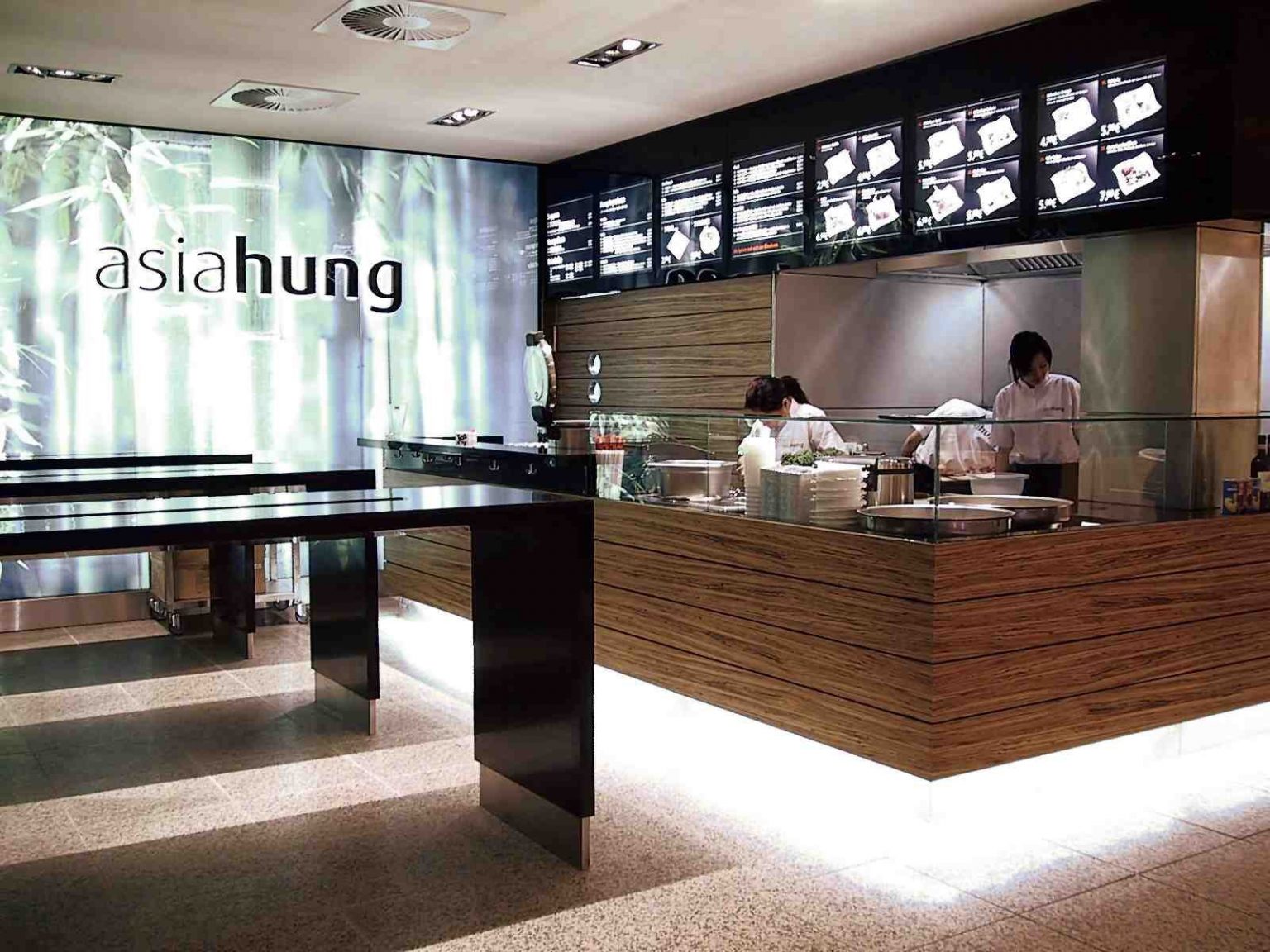authêntic?
« previous post | next post »
Alex Baumans sent in the photo below, with the note "I came across this fast food restaurant on a recent trip to Germany. The franchise appears to be specialised in 'panasiatic' crossover cooking."
The Asiahung chain is apparently German:
Unsere frühen Wurzeln liegen in Schwerin. 1998 wurde dort das erste Restaurant von Frau Pham, Thi Thanh Xuan als kleines Familienunternehmen gegründet und konzentrierte sich zunächst nur auf die Zubereitung von chinesischen Speisen. Mit der Zeit erkannten wir die breite Akzeptanz der Verbraucher für die asiatische Küche im Allgemeinen und entwickelten ein panasiatisches Konzept für unsere Restaurants, in dem eine Vielzahl von asiatischen Spezialitäten gebündelt werden.
Our early roots are in Schwerin. In 1998, Ms. Pham, Thi Thanh Xuan founded the first restaurant there as a small family business and initially only focused on the preparation of Chinese dishes. Over time, we recognized the broad consumer acceptance of Asian cuisine in general and developed a pan-Asian concept for our restaurants, bundling a variety of Asian specialties.
I guess the "-hung" part evokes hunger, which exists in German as well as in English, though in an English-speaking context the first association would unfortunately be with hanging. And the circumflex is apparently meant to evoke Vietnamese — but maybe a commenter can explain why it's "authêntic" and not "authêntisch"?
Here's another picture, from the internet:
Update — and another picture (no "authêntic"), from a news story about the founder's death in a 2020 auto accident (Wikipedia here):



Philip Taylor said,
August 17, 2022 @ 4:32 pm
The founder of the chain, Phạm Thị Thanh Xuân, sadly died in a motoring accident while driving her Tesla in 2020; she was only 48 years of age.
JJM said,
August 17, 2022 @ 5:13 pm
"I guess the '-hung' part evokes hunger, which exists in German as well as in English, though in an English-speaking context the first association would unfortunately be with hanging."
Or with something anatomical.
Viseguy said,
August 17, 2022 @ 7:05 pm
"Authêntic" feels about as authentic as "Häagen-Dazs".
Carl said,
August 17, 2022 @ 10:02 pm
When I went to Berlin, I was told that during the Cold War, East Germany had a guest worker program with Vietnam, similar to the better known Turkish guest worker program of the West. I suppose that as a result Vietnamese food and Vietnamese writing are the primary associations of “Asian food” in Germany.
AlexB said,
August 18, 2022 @ 12:27 am
What I really like is that, of all the words they could have put a fake circumflex on, they chose 'authentic'.
David Marjanović said,
August 18, 2022 @ 1:59 am
Asia is English, too; it's used on stores that sell "Asian" food in Germany and on "Asian" supermarket food.
So… is there a Vietnamese word thên with an interesting meaning, or is this really just like Häagen Dazs?
Certainly in the East, where Schwerin is.
maidhc said,
August 18, 2022 @ 3:01 am
Here is an example of Asian food as offered in Germany. Note that above the door it says "Fernost Asiatische Spezialitäten". So no Indian food. Many of these places have Indian food too. Or what is represented as such.
That's the context behind "authêntic". There's a subtle difference between that and authentisch. I like the way that in the US we make things look exotic by throwing in an unneeded umlaut, but in Germany they throw in a circumflex.
I was tempted by the idea that perhaps the restaurant might have broadened their offerings to include goulash or chicken paprikash, but in German it's ungarisch. Perhaps "hung" might mean something in some Asian language? The only one I have a dictionary for is Mandarin, and no such word exists.
Not to criticize the restaurant, because they're just providing what the customers want. Like in some restaurants run by Chinese people in the US, you are offered saltine crackers with your hot and sour soup, and in the UK you get a choice of rice or chips.
maidhc said,
August 18, 2022 @ 3:06 am
This is an experiment to see if I can embed an image.
There is no preview here, so experiments have to be done for real.
maidhc said,
August 18, 2022 @ 3:07 am
I guess not.
~flow said,
August 18, 2022 @ 4:16 am
@David Marjanović
> Asia is English, too; it's used on stores that sell "Asian" food in Germany and on "Asian" supermarket food.
Yes and no. Myself I say "Asia-Laden" and even "Asia-Shop" with 'Asia' being the G ['a:zia], not the E [ˈeɪʃə]/[ˈeɪʒə]. Here 'Asia' is distinct from 'Asien' in referring not to anything and everything Asian but more specifically to (I'd say) South-East and East Asia, especially in the context of food and cultural items marketed in Europe / the West.
Francois Lang said,
August 18, 2022 @ 8:00 am
I have but moderate knowledge of German, but isn't "Fernost Asiatische" redundant? Doesn't it mean "far-east Asian"?
Philip Taylor said,
August 18, 2022 @ 8:31 am
Assuming that Fernost Asiatische does mean "far-east Asian", I don't see how that leads to a redundancy — if you agree that people (and food) from the Indian sub-continent are/is Asian, then Fernost Asiatische serves to differentiate those/that who/which come(s) from further east (China, Vietnam, etc).
Peter Grubtal said,
August 18, 2022 @ 8:53 am
Francois Lang: according to the ancient Greeks, Asia began at the Hellespont. Anatolia, (pretty much coincident with modern Turkey) was known as Asia Minor.
tsts said,
August 18, 2022 @ 9:39 am
@Carl: Yes, East Germany had a guest worker program with Vietnam, and when the wall came down, tens of thousands of these workers were more or less stranded in East Germany, usually the first to get laid off from their factory jobs, and looking for various ways to support themselves, from opening restaurants to selling illegal cigarettes.
But there was also an influx of tens of thousands of "boat people" refugees in the 1980s. This resulted in Germany basically having two different communities of Vietnamese immigrants, the mostly ethnic Chinese refugees in the West, and the mostly ethnic Vietnamese workers in the East. After the wall fell, some of the refugees in the West also went East to open up restaurants there – and in some cases also to other countries in Eastern Europe as there was a new and lucrative market.
The founder of this chain followed her brother from Vietnam to Berlin in 1992, after reunification. I do not know to which of the two groups her brother belonged — if any.
In general, it seems most of the "Asia Restaurants" in Germany are a fusion anyway — a lot of Vietnamese influence, more Southeast Asian inspired than Chinese, but also offering sort of Chinese dishes. As there are typical American Chinese dishes, there are also typically German Asian dishes that lean heavily on sweet and sour sauces and extremely crispy ducks. (Plus a wave of newer and more authentic Chinese restaurants mainly by immigrants from the mainland.)
F said,
August 18, 2022 @ 10:27 am
The circumflex may be supposed to evoke Vietnamese, but it actually appears there in Portuguese (autêntico)
Terry K. said,
August 18, 2022 @ 2:24 pm
I would take "Far East Asian" as redundant in English, as the Far East is in Asia. Though perhaps acceptable in a context where one wants to make Asia explicit and then say what part of Asia. (Though I'd perfer "The Far East part of Asia" or something similar.)
But does Fernost have the meaning of Far East (named region), or does it just mean far to the east?
V said,
August 18, 2022 @ 4:39 pm
Asian Food pretty much means Vietnamese in Bulgaria(at least in certain parts), unless you specify Japanese or Chinese. Or Hmong or Thai, in rare cases. Indian does not mean Indian, Indian means Indian.
Michael Watts said,
August 18, 2022 @ 5:22 pm
I would be extremely surprised if an English speaker came out with /eɪʃə/ rather than /eɪʒə/. Is that pronunciation used somewhere?
Michael Watts said,
August 18, 2022 @ 5:46 pm
Some followup:
I listened to the first 20 examples presented on youglish.com for pronunciation of the word "Asia". I would say that 19 out of the 20 unambiguously used /ʒ/, zero out of 20 unambiguously used /ʃ/, and one was ambiguous, pronounced by a non-native speaker.
(The sample isn't perfect; there were several appearances from the same person (Barack Obama) and only one of the native speakers was obviously not American. But still.)
Wiktionary, and Merriam-Webster, both acknowledge a pronunciation with /ʃ/, but based on personal experience and the Youglish sample, my first guess would be that they're wrong.
Misha Schutt said,
August 18, 2022 @ 7:13 pm
Fareed Zakaria (CNN), born in Mumbai, educated in Britain and US, says [ˈeɪʃə] at least some of the time. I wonder if it’s an older British pronunciation.
John Swindle said,
August 19, 2022 @ 2:12 am
I wonder whether they have carrots on the menu.
Philip Taylor said,
August 19, 2022 @ 5:47 am
" I would be extremely surprised if an English speaker came out with /eɪʃə/ rather than /eɪʒə/. Is that pronunciation used somewhere ? " — the United Kingdom ? Standard pronunciation, to my ears (and mind), although high RP might require /ˈeɪsjə/.
Jenny Chu said,
August 19, 2022 @ 8:11 am
I am also interested in the fact that the founder has a very typically Vietnamese name but the menu was originally Chinese. Should I assume she was Chinese Vietnamese, ie "District 5" or similar? But is Schwerin in Eastern Germany? If so, it's more likely that the founder was from Northern Vietnam (the guest workers of the Socialist Brotherhood had to be loyal) and thus, after 1954, less likely to be ethnically Chinese.
My guess is that the branding is created by the second generation, who may not even know how to write Vietnamese.
~flow said,
August 19, 2022 @ 8:42 am
re pronunciation of 'Asia'—I quoted both forms because this word has been puzzling me for too long, and my quick lookup tool gave both voiced and unvoiced variants; FWIW the unvoiced ones are all British sources, so yes, might be more British than American. Guess I'll stick with the voiced variant then.
Michael Watts said,
August 19, 2022 @ 1:09 pm
I'm listening to Youglish videos marked "UK" and they're just as overwhelmingly /ʒ/ as the American ones. Which is to say, all of the native-sounding examples are /ʒ/, and none of them are /ʃ/ (or /sj/).
As a sanity check, would you mind browsing through Youglish and telling me whether I just can't hear the difference?
Merriam-Webster is a specifically American resource and it does report the /ʃ/ pronunciation. The sources are on your side! But I find this confusing.
Michael Watts said,
August 19, 2022 @ 1:12 pm
(Obviously, my judgment of whether someone's UK-accented English "sounds native" is less reliable than my judgment of whether an American accent sounds native. This is not as much of a problem as it could be – I only mean to exclude the same video I reported as sounding non-native in my survey of 20 examples of "any variety of English", which came up again for the UK.)
Michael Watts said,
August 19, 2022 @ 4:16 pm
I guess I'll post a further followup to note that, while I identified zero uses of /ʃ/ in "Asia" in the first 15 "UK" examples I found on Youglish, I did notice two such uses in examples 16-25, of which one was somewhere on a continuum between /eɪʃə/ and /eɪsiə/, which I take to have been described as the prestige pronunciation.
I would still be interested in Philip Taylor's evaluation of how UK sources are currently pronouncing the word.
Philip Taylor said,
August 19, 2022 @ 4:23 pm
Fair enough, Michael — I have never listened to "Youglish" before, and sat through nearly 17 minutes of someone talking about design before I thought to re-wind to the very beginning and finally heard the word "Asian". And, in both that and the next seven recordings to which I listened, all by speakers of British English, I heard /eɪʒən/ rather than /ˈeɪʃən/. So, what can I say ? For me, the word has always been /ˈeɪʃən/ (or /ˈeɪsjən/, if I'm speaking particularly carefully) and I thought that the majority of my fellow Britons did the same — clearly I was wrong. John Well, in the LPD, reports /ˈeɪʒ ən ˈeɪʃ-/, yet his speaker clearly uses the latter form rather than the former. For Asia, he says —
so it would seem that, in this instance at least, I am modelling my speech on that of an earlier generation.
Michael Watts said,
August 19, 2022 @ 6:38 pm
The shift over time is interesting. I hold a weak belief that intervocalic voiced fricatives are preferred to unvoiced ones and so fricatives in common words may tend to develop voicing over time, which this would support. I'm not sure how true that really is; not everyone seems to share my view that the voiced fricatives are more natural intervocalically.
Anthony said,
August 19, 2022 @ 8:19 pm
I remember being taught in junior high school to pronounce "'Asia" voicelessly. Which none of us students (New Yorkers) did anymore than we pronounced "news" to rhyme with "pews". News is "nooze."
Sanchuan said,
August 20, 2022 @ 12:40 am
For hours and hours of ˈeɪʃə, I refer you to any documentary presented by British historian Michael Wood. I remember noticing while watching his Story of China on the BBC.
I associate that pronunciation with many people of his generation (in England).
Tom said,
August 21, 2022 @ 4:12 pm
“authêntic” evokes a French-Vietnamese pronounciation, a rejection of the English "th".
“asia” is pronounced "Uh-Zee-Ya", not: eɪʒ ə or ˈeɪʃ ə .
"hung" is either "'ng" or "hoong", evoking "Hunger", as in hungry.
Regarding "Fernost Asiatische": “Far East” in Russian contexts implies Siberia. East Germans had been primed to understand the Russian context.